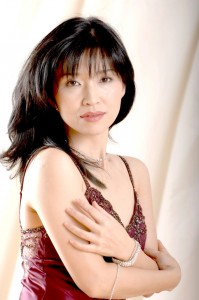Interview with Jazz Musician Keiko Matsui
By JQ magazine’s Justin Tedaldi (CIR Kobe-shi, 2001-02) for Examiner.com. Visit his NY Japanese Culture page here to subscribe for free alerts on newly published stories.
Contemporary jazz icon Keiko Matsui began playing piano at the age of five. With sales of over 1.2 million units in the U.S. and sold-out appearances at concert halls across the world, she is one of the most recognized artists in the genre.
In addition to being the first Japanese artist to top Billboard’s contemporary jazz chart, she actively supports a range of charities, including the Y-Me Breast Cancer Organization. United Nations World Food Programme’s efforts in Africa, and California for A3M’s charity for the National Marrow Donor Program.
Matsui is now putting the final touches on her latest album, due early 2011 with Shanachie Records. I spoke with her prior to her debut three-night stand happening next week at New York’s venerable Blue Note Jazz Club.
Congratulations on your very first show at New York’s Blue Note. How do you feel about playing there and what do you expect?
Of course in New York, Blue Note is a legendary place, and I’m very happy to be there. At the same time, I have toured in many different countries, and I always feel very fortunate at the concerts to feel that music connects us beyond the culture, history, country, everything. So, I really feel that this experience at Blue Note will be very special.
When did you first come to the U.S.?
In the early ’80s.
What did you do there?
At that time, I was invited to Los Angeles by Yamaha for a special recording. I was also a student, and had the opportunity to make a sample album with Vinnie Colaiuta and Nathan East. That was my first visit to the U.S., and also my first recording there. I invited Vinnie to record on my new album, so I’m glad to see him again.
What were your memories of that experience? Did you have any culture shock?
I only had one week there, so of course I didn’t know much about the music scene in the U.S., but I was so entranced by Nathan and Vinnie’s playing. It was great creating music together with great musicians, but at that time they were so open. Maybe this is a cultural difference, because Japanese language is based on politeness and different words depending on who you talk to, but English doesn’t have that. So, Japanese people speak really strictly, I felt.
You’ve had a successful career for a long time. Why have you decided to play Blue Note now?
That’s true. For me, that’s something I’m kind of questioning myself, too. [laughs]
Click here to read the rest of the interview.



Comments are closed.